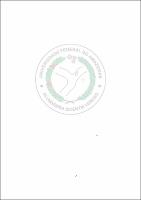| ???jsp.display-item.social.title??? |


|
Please use this identifier to cite or link to this item:
https://tede.ufam.edu.br/handle/tede/9977| ???metadata.dc.type???: | Dissertação |
| Title: | Estudo químico e biológico de uma linhagem do Penicillium citreosulfuratum |
| ???metadata.dc.creator???: | Andrade, Richelly dos Santos  |
| ???metadata.dc.contributor.advisor1???: | Souza, Afonso Duarte Leão de |
| ???metadata.dc.contributor.referee1???: | Gomes, Waldireny Rocha |
| ???metadata.dc.contributor.referee2???: | Flach, Adriana |
| ???metadata.dc.description.resumo???: | Os fungos endofíticos são uma fonte rica de produtos naturais com diversas atividades biológicas, apresentando grande potencial para a indústria alimentícia e farmacêutica. A produção de metabólitos fúngicos in vitro pode ser otimizada através de técnicas que envolvem a química, bioquímica e biologia molecular, com um custo associado relativamente baixo. Apesar de serem importantes fontes de compostos bioativos, a diversidade dos fungos endofíticos, especialmente os do gênero Penicillium, ainda é explorada de forma insuficiente no Brasil, em especial na região amazônica. Portanto, o objetivo do presente trabalho foi investigar os metabólitos secundários produzidos por uma linhagem de Penicillium citreosulfuratum preservado na coleção do Laboratório de Bioensaios e Microrganismos da Amazônia (LABMICRA) da Central Analítica do Centro de Apoio Multidisciplinar da UFAM. Assim, a linhagem de P. citreosulfuratum codificada como M167 (LabMicrA 1245) foi cultivada em meio líquido BDL a partir de esporos preservados na coleção do LABMICRA. Durante o cultivo, que contou com o monitoramento do nível de glicose e pH, alíquotas foram separadas e analisadas através de inserção direta em espectrômetro de massas (MS). As frações mais relevantes, baseado nas análises de MS, foram preparados e submetidos a fracionamentos em coluna aberta e HPLC, utilizando-se C-18 como fase estacionária. Em adição, os extratos foram submetidos a ensaios larvicida, antimicrobiano e citotoxicidade. Através das análises por MS foi possível desreplicar o policetídeo citreoviridina na fração Pc3. Por sua vez, o fracionamento cromatográfico resultou no isolamento do alcalóide isorugulosuvina e do policetídeo 10Z-isocitreoviridinol. Em conclusão, o presente trabalho demonstrou que P. citreosulfuratum é uma valiosa fonte de metabólitos secundários com atividades biológicas diversas. Essas descobertas destacam o potencial promissor dos fungos endofíticos do gênero Penicillium presentes na região amazônica como fonte de produtos naturais para aplicações biotecnológicas. No entanto, mais pesquisas são necessárias para explorar a linhagem estudada e a diversidade e potencial biotecnológico dos fungos endofíticos existentes na região amazônica. |
| Abstract: | Endophytic fungi are a rich source of natural products with diverse biological activities, presenting great potential for the food and pharmaceutical industries. The production of fungal metabolites in vitro can be optimized through techniques involving chemistry, biochemistry and molecular biology, with a relatively low associated cost. Despite being important sources of bioactive compounds, the diversity of endophytic fungi, especially those of the genus Penicillium, is still insufficiently explored in Brazil, especially in the Amazon region. Therefore, the objective of the present work was to investigate the secondary metabolites produced by a strain of Penicillium citreosulfuratum preserved in the collection of the Laboratory of Bioassays and Microorganisms of the Amazon (LABMICRA) of the Analytical Center of the Multidisciplinary Support Center of UFAM. Thus, the P. citreosulfuratum strain coded as M167 (LabMicrA 1245) was cultivated in BDL liquid medium from spores preserved in the LABMICRA collection. During cultivation, which included monitoring the level of glucose and pH, aliquots were separated and analyzed by direct insertion into a mass spectrometer (MS). The most relevant fractions, based on MS analyses, were prepared and subjected to open column fractionation and HPLC, using C-18 as the stationary phase. In addition, the extracts were subjected to larvicide, antimicrobial and cytotoxicity assays. Through MS analysis it was possible to dereplicate the polyketide citreoviridin in the Pc3 fraction. In turn, the chromatographic fractionation resulted in the isolation of the alkaloid isorugulosuvine and the polyketide 10Z-isocitreoviridinol. In conclusion, the present work demonstrated that P. citreosulfuratum is a valuable source of secondary metabolites with diverse biological activities. These findings highlight the promising potential of endophytic fungi of the genus Penicillium present in the Amazon region as a source of natural products for biotechnological applications. However, more research is needed to explore the studied lineage and the diversity and biotechnological potential of the endophytic fungi found in the Amazon region. |
| Keywords: | Fungos - Análise |
| ???metadata.dc.subject.cnpq???: | CIENCIAS EXATAS E DA TERRA: QUIMICA: QUIMICA ORGANICA: QUIMICA DOS PRODUTOS NATURAIS |
| ???metadata.dc.subject.user???: | Policetídeo Alcalóides Citreoviridina Isorugulosuvina 10Z-isocitreoviridinol |
| Language: | por |
| ???metadata.dc.publisher.country???: | Brasil |
| Publisher: | Universidade Federal do Amazonas |
| ???metadata.dc.publisher.initials???: | UFAM |
| ???metadata.dc.publisher.department???: | Instituto de Ciências Exatas |
| ???metadata.dc.publisher.program???: | Programa de Pós-graduação em Química |
| Citation: | ANDRADE, Richelly dos Santos. Estudo químico e biológico de uma linhagem do Penicillium citreosulfuratum. 2023. 101 f. Dissertação (Mestrado em Química) - Universidade Federal do Amazonas, Manaus, 2023. |
| ???metadata.dc.rights???: | Acesso Aberto |
| ???metadata.dc.rights.uri???: | https://creativecommons.org/licenses/by-nc-nd/4.0/ |
| URI: | https://tede.ufam.edu.br/handle/tede/9977 |
| Issue Date: | 15-Sep-2023 |
| Appears in Collections: | Mestrado em Química |
Files in This Item:
| File | Description | Size | Format | |
|---|---|---|---|---|
| DISS_RichellyAndrade_PPGQ.pdf | 3 MB | Adobe PDF |  Download/Open Preview |
Items in DSpace are protected by copyright, with all rights reserved, unless otherwise indicated.




